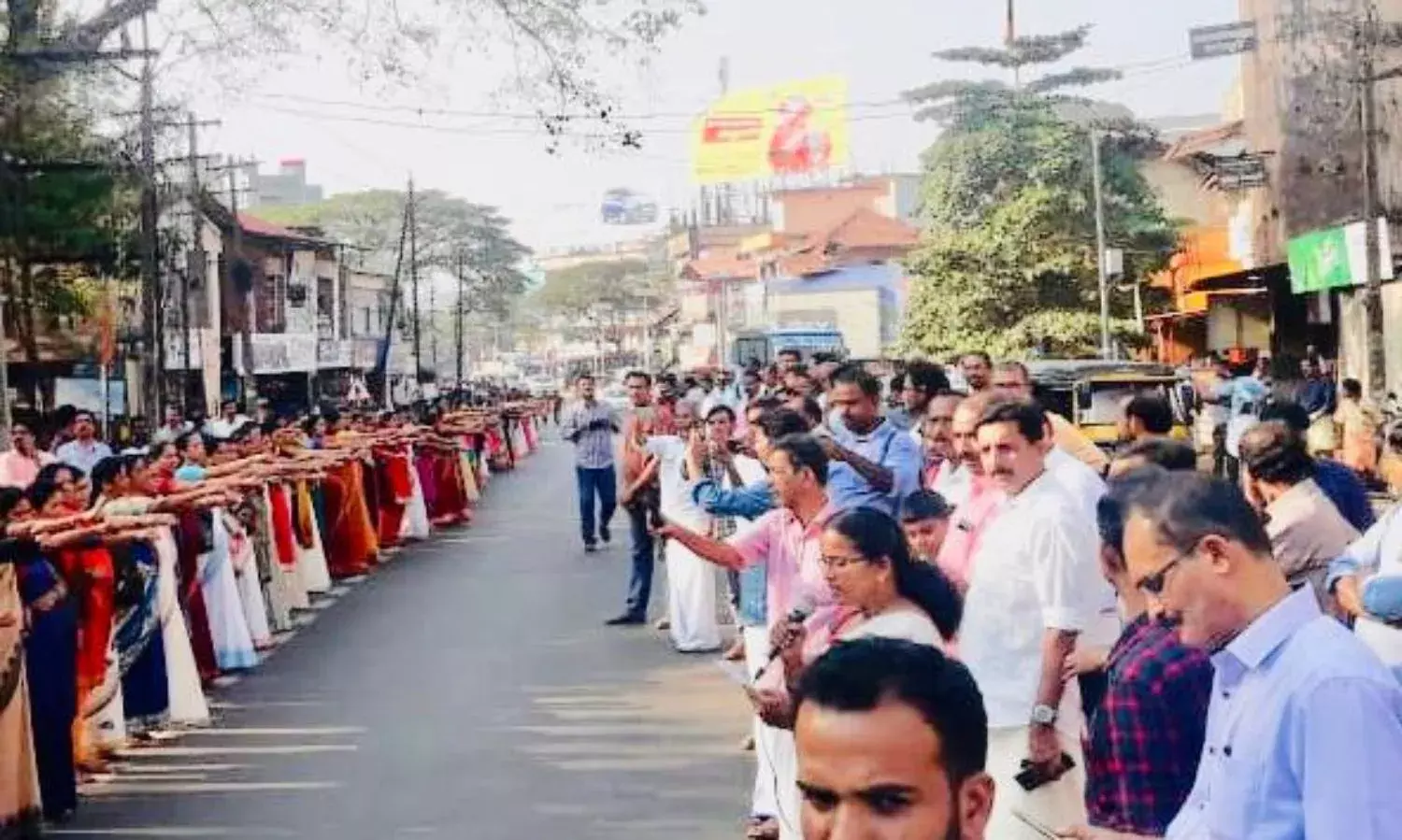Marching for Equality, Hand in Hand
A Vanita Mathil or Women's Wall was created in Kerala yesterday

On January 1, over five million women from across Kerala formed a wall miles long, the Vanita Mathil or Women’s Wall, calling for the rejection of patriarchal tendencies in contemporary Kerela society. Participation in this protest cut across caste, gender and religious lines.
In the light of this movement The Citizen interviewed Sathi Devi, general secretary of the All India Democratic Women’s Association or AIDWA, the women’s wing of the Communist Party of India which organised the protest, and student representative Aishe Ghosh, who participated in it.
The journey for women’s rights
Devi told The Citizen, “For the past several years we have observed December 10 as Human Rights Day but we at AIDWA celebrate it as Women’s Rights Day, because people are of the opinion that ‘human rights’ are for men but women are also equally human. This December 10 we had our meeting and the state committee decided to go ahead with it.”
How the movement was organised
“We have 24,000 units who worked and campaigned in 2,000 villages across Kerala for the movement. Seven Left-oriented organisations and a lot of independent organisations participated. Around 55 lakh women participated to rebuff patriarchal and communal propaganda,” said Devi.
Reasons for the movement
Devi told The Citizen, “For the last three months many attempts have been made to create a problem in the cultural background itself. As compared to other states of India, Kerala is very progressive in terms of the education and health sectors. But the fundamentalists are still trying to create problems for our renaissance.”
Referring to the Sabrimala issue, Devi underlined that “everyone has the basic right to have ‘freedom’, be it to worship or to travel in public places. Women are not allowed to enter public places. This time, women have protested to protect their rights.”
“In 1952 when the state of Kerala was made, it was decided to bring social development in society. We stood together to bring back social service, where our rights are protected and supplemented.”
The women’s reservation bill - 33% or 50%
“Reservation for women in Parliament is still an issue. Despite our being in the 70th year of the Constitution the Modi government has not taken up the issue of women’s reservation.
“Back in 2007 the bill was passed in the Rajya Sabha but despite its majority in the Lok Sabha the Modi government has done nothing.
“He is wandering all around the world talking about digital India and women’s rights, but in reality women are not even given the chance to participate.
“In coming times we will certainly protest for the bill to be passed. We are asking the Left parties to give greater response on the reservation issue,” said Devi.
Impact of the movement
“I am very proud to say that on January 1, 2019, women of Kerala seemed more confident in society. The movement will certainly have an impact on men as well - they need to understand that women are also human beings with civil and political rights.
“Women cutting across communal, caste, religious and political ideas came together to give a new impression - marching for equality, hand in hand.
“Women from religious minorities participated in great numbers. Women from all backgrounds came together wearing their uniforms; there were women in pardah too.”
A participant’s view
Aishe Ghosh, a convenor of the Jawaharlal Nehru University Students’ Union, saw the movement as a revolution in women’s rights.
Ghosh told The Citizen that “age old traditions have become so important that constitutional provisions for gender equality are not being implemented and upheld.
“The women’s wall is an important example of women of the state coming out for equality with men. The wall is a moment of self resistance for all women who want to stand for gender equality, who want to give the clear message that women can take their own decisions and should be treated as equal human beings.
“Building the Vanitha Mathil is a revolution of its own kind but not the end,” said Ghosh, adding that over 150 organisations participated in the protest.
Ghosh observed that only today was it in the news that two women entered the Sabarimala temple - “this shows the courage women are getting in the state after the Supreme Court’s order.”
As a participant, said Ghosh, the wall was “a beautiful portrayal of how caste, class and gender struggles can be fought in the streets”. It astonished her that “not a single disturbance was felt - it was so simple and natural that it didn’t feel like anything grand was happening.
“Vanitha Mathil had to be successful because women here know what they want. Women here, from long before, know how to fight their resistance.”
On the participation of transwomen, Ghosh added, “Trans women consider Pinarayi Vijayan their god. They are really happy about the participation they are being offered by the current Left Democratic Front government.”
Overall, according to Ghosh, “it was quite peaceful and encouraging for women living in different cities to know women in Kerala are fighting the patriarchal structure without any fear, with glee and courage and bravery.”



